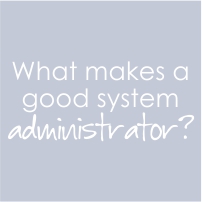 Organisations are often baffled when a newly implemented PPM tool does not deliver the expected returns. The blame often falls on the implementation approach, the end-users, inadequate change management processes and, more often than not, the tool itself.
Organisations are often baffled when a newly implemented PPM tool does not deliver the expected returns. The blame often falls on the implementation approach, the end-users, inadequate change management processes and, more often than not, the tool itself.
However, the one person who can make or break your PPM tool is often over-looked, the system administrator! The system administrators are undoubtedly some of the most important people to consider when implementing a new PPM tool, yet this is often the role assigned to the most junior person on the team or added to someone else’s already exorbitant list of responsibilities.
It is worthwhile to consider the competencies that make good system administrators, prior to assigning them. Seven key competencies have been identified and are discussed briefly in this article.
Key competency 1: Problem solving
“The problem with troubleshooting is that trouble shoots back ~ Author Unknown”
Perhaps the most important skill for system administrators is problem solving. Problem solving often needs to be done under various constraints and huge amounts of pressure. The system administrators need to be able to quickly and correctly diagnose problems with the system, deduct the cause of the problem and fix it swiftly and efficiently. This will require the administrator to have a good knowledge of the PPM tool, a fair amount of analytical brainpower and knowledge of some basic problem solving methods.
Key competency 2: Communication skills
Good system administrators can listen attentively and comprehend quickly what users are trying to explain. They also need to be able to clearly and effectively transmit technical and business concepts, ideas, feelings, opinions, and conclusions orally and in writing, often to non-technical persons or people who are not very systems orientated.
Key Competency 3: Strong facilitator
A facilitator is someone who helps a group of people understand their common objectives and assists them to plan to achieve these objectives without taking a particular position in the discussion. They need to remain objective and focused, steering the group towards the shared goal.
Good system administrators make things happen through collaboration with other members of the team. System administrators should draw on their users’ strengths and involve them with decisions that may affect them.
Key Competency 4: Decision making abilities
System administrators need to be able to consider several alternatives and options and make informed, educated decisions. Decisions often need to be made during crisis or high pressure situations, placing greater stakes on the decision’s outcome. Good system administrators are also to swiftly re-evaluate and change course if a decision has been proven ineffective or incorrect.
Key Competency 5: Understanding of technical elements and data structures
System administrators need to be the knowledge leaders with regards to their system. An up-to-date knowledge of discrete and intricate elements of the PPM tool as well as a firm grasp of technical and structural concepts is an absolute must for a good system administrator.
The administrators need to be able to identify means of integrating technical support requirements with enterprise processes and strategies. Good administrators also need to identify opportunities where the PPM tool could meet new or complicated organisational needs.
Key Competency 6: Accountability
Good system administrators clearly define the expectations of themselves and of others and then take the appropriate actions to ensure their obligations are met. Good system administrators have a high sense of responsibility and accountability. They set standards and objectives for themselves and others and assists their PPM tool users with prioritising and reaching these goals.
Key Competency 7: Initiative
Lastly, good system administrators take initiative. They don’t wait for others to take the lead, but voluntarily take the first steps to identify and address existing and potential obstacles, issues, and opportunities. Administrators that take initiative often prevent problems from occurring in the first place and will be better equipped to deal with whatever comes their way.
The qualities described above are more natural to certain personalities, but all of these qualities can be learned and improved upon. If your administrators are lacking in these respects, an important decision needs to be made – either reassign the role to someone more suitable, or invest some well-spent time and effort on improving these competencies in your current administrator.
Are you looking for a project management tool that will make life easier for your system administrator? If so, try a free 30-day trial of Project Portfolio Office (PPO) today at www.go2ppo.com/try.php.
PPO is an award winning online project portfolio management and collaboration application. PPO is simple, immediate, secure and affordable. PPO is flexible and can be configured to support any methodology.


